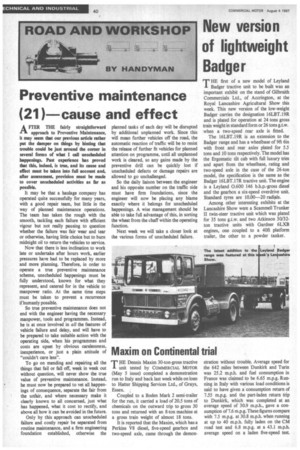Preventive maintenance (21) cause and effect
Page 42

If you've noticed an error in this article please click here to report it so we can fix it.
FTER THE fairly straightforward approach to Preventive Maintenance, it may seem that our previous article rather put the damper on things by hinting that trouble could be just around the corner in several forms of what I call unscheduled happenings. Past experience has proved that this, indeed, is true, and its cause and effect must be taken into full account and, after assessment, provision must be made to cover unscheduled activities as far as possible.
It may be that a haulage company has operated quite successfully for many years, with a good repair team, but little in the way of planned maintenance operations. The team has taken the rough with the smooth, tackling each failure with efficient vigour but not really pausing to question whether the failure was fair wear and tear or otherwise, having little choice but to burn midnight oil to return the vehicles to service.
Now that there is less inclination to work late or undertake after hours work, earlier pressures have had to be replaced by more and more planning. Therefore, in order to operate a true preventive maintenance scheme, unscheduled happenings must be fully understood, known for what they represent, and catered for in the vehicle to manpower ratio. At the same time steps must be taken to prevent a recurrence if humanly possible.
So true preventive maintenance does not end with the engineer having the necessary manpower, tools and programmes. Instead, he is at once involved in all the features of vehicle failure and delay, and will have to be prepared to take suitable action with the operating side, when his programmes and costs are upset by obvious carelessness, inexperience, or just a plain attitude of "couldn't care less".
To go on mending and repairing all the things that fail or fall off, week in week out without question, will never show the true value of preventive maintenance. Instead, he must now be prepared to vet all happenings of consequence, separate the fair from the unfair, and where necessary make it clearly known to all concerned, just what has happened, what it cost to rectify, and above all how it can be avoided in the future.
Only by this approach can unscheduled failure and costly repair be separated from routine maintenance, and a firm engineering foundation established, otherwise the planned tasks of each day will be disrupted by additional unplanned work. Since this will mean further vehicles off the road, the automatic reaction of traffic will be to resist the release of further fit vehicles for planned attention on programme, until all unplanned work is cleared, so any gains made by the preventive drill can be quickly lost if unscheduled defects or damage repairs are allowed to go unchallenged.
So the daily liaison between the engineer and his opposite number on the traffic side must have firm foundations, since the engineer will now be placing any blame exactly where it belongs for unscheduled happenings. A wise management should be able to take full advantage of this, in sorting the wheat from the chaff within the operating function.
Next week we will take a closer look at the various forms of unscheduled failure.












































































































